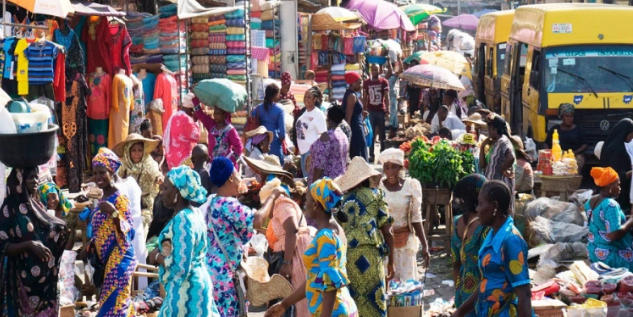
Newsonline Nigeria reports that Nigeria’s inflation surged to 24.08% in the month of July 2023, a 129 basis-point increase compared to 22.79% recorded in the previous month.
This represents the sixth consecutive increase in the headline index this year.
This is according to the recently released Consumer Price Index (CPI) report for July 2023 by the National Bureau of Statistics (NBS).
The significant jump is following the complete removal of petrol subsidies and the unification/devaluation of the official exchange rate.
Notably, on a month-on-month basis, the headline inflation rate stood at 2.89% in July which was 0.76% higher than the rate recorded in June 2023 (2.13%).
In terms of contribution to the year-on-year inflation, Food and non-alcoholic beverages (12.47%) contributed the most, followed by housing water, electricity, gas and other fuel (4.03%), and clothing and footwear (1.84%).
The Food inflation rate rose to 26.98% in July 2023, representing a 1.73% point increase from 25.25% recorded in the previous month and 4.97% points higher than 22.02% recorded in the corresponding period of 2022.
The “All items less farm produce” or Core inflation, which excludes the prices of volatile agricultural produce stood at 20.47% in July 2023 on a year-on-year basis; up by 4.41% when compared to the 16.06% recorded in July 2022.
In July 2023, all items inflation rate on a year-on-year basis was highest in Kogi (28.45%), Lagos (27.30%), Ondo (26.83%), while Borno (20.71%), Jigawa (20.85%) and Sokoto (20.92%) recorded the slowest rise in headline inflation on a year-on-year basis.
On a month-on-month basis, however, July 2023 recorded the highest increases in Kogi (4.99%), Abia (4.12%), Akwa Ibom (4.07%), while Jigawa (0.16%), Taraba (1.09%) and Yobe (1.10%) recorded the slowest rise on month-on-month inflation.
In terms of food inflation, Kogi State recorded the highest at 34.53% in the review month, followed by Lagos (32.52%), and Bayelsa (31.31%), while Jigawa (20.90%), Sokoto (21.63%) and Kebbi (22.45%) recorded the slowest rise in Food inflation.
The NBS clarified last month that the inflation data for the month of June might not entirely reflect the effects stemming from the removal of fuel subsidies and the unification of the exchange rate.
This came in response to apprehensions voiced by analysts and the Nigerian populace, suggesting that the inflation statistics for Nigeria might be presenting a less comprehensive picture.
Nonetheless, the statistics are now revealing an upsurge in line with the observed trends in the economy. This is evident in the significant escalation of food, energy, and transport cost. An article published by Nairametrics recently highlighted that the cost of intra-city transportation in the country surged by an astounding 97% in the span of a single month.
Transportation expenses experienced a widespread spike nationwide, largely attributed to the pronounced rise in petrol prices, surging from an average of N185 per litre to a staggering high of N565 per litre. Similarly, the unification and devaluation of the official exchange rate have led to the Nigerian Naira trading at a rate exceeding N740 per US Dollar, marking a substantial devaluation from the preceding average of N460 per US Dollar.
EFCC has denied banning foreign missions from transacting in dollars. NewsOnline Nigeria reports that…
President Tinubu has banned the purchase of petrol-dependent vehicles. NewsOnline Nigeria reports that President…
The details of Peter Obi’s meeting with Atiku, Saraki, and Lamido have emerged. NewsOnline…
Governor Fubara has vowed to establish an investigative panel to probe Wike. NewsOnline Nigeria…
NLC and TUC have shut down disCos offices nationwide over the electricity tariff hike amid…
EFCC has applied to join Diezani Alison-Madueke’s UK trial. NewsOnline Nigeria reports that the…